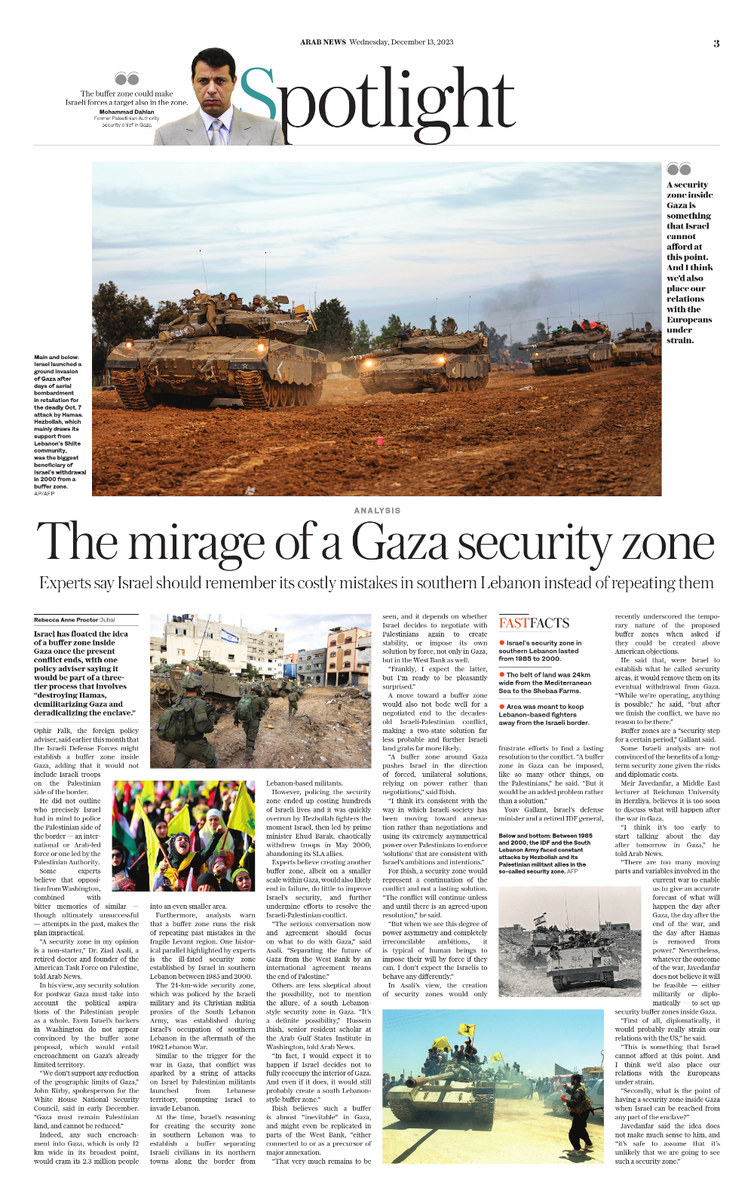DUBAI: Israel has floated the idea of a buffer zone inside Gaza once the present conflict ends, with one policy adviser saying it would be part of a three-tier process that involves “destroying Hamas, demilitarizing Gaza and deradicalizing the enclave.”
Ophir Falk, the foreign policy adviser, said earlier this month that the Israeli Defense Forces might establish a buffer zone inside Gaza, adding that it would not include Israeli troops on the Palestinian side of the border.
He did not outline who precisely Israel had in mind to police the Palestinian side of the border — an international or Arab-led force or one led by the Palestinian Authority.
“There are discussions in Israel about how we want to see Gaza when the war is over, given the Oct. 7 attack,” Falk told Reuters news agency, referring to the assault on southern Israel by Palestinian militants that resulted in 1,400 deaths and the abduction of 240 people.
He added: “The defense establishment is talking about some kind of security buffer on the Gaza side of the border so that Hamas cannot gather military capabilities to the border and surprise Israel again.
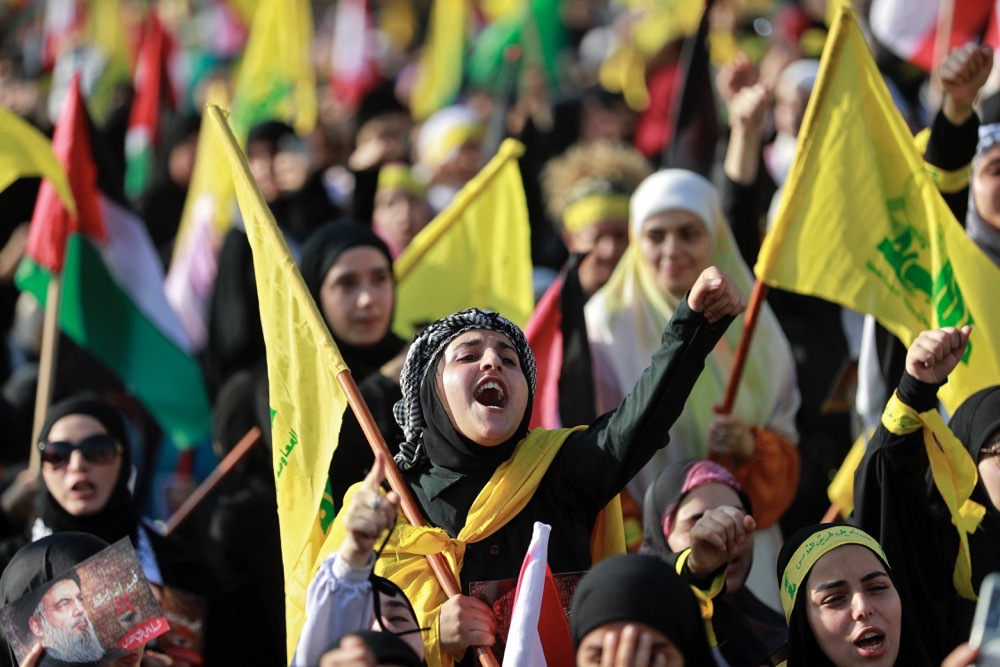
Supporters of the Lebanese Shiite movement Hezbollah wave flags as they watch a televised speech by its leader Hassan Nasrallah. (AFP)
“It is a security measure, not a political one. We do not intend to remain on the Gaza side of the border.”
According to sources who spoke to Reuters, Israel has relayed these plans to officials in Jordan and Egypt, with whom Israel has had long-established ties, and the UAE, which normalized relations with Israel in 2020.
Some experts believe that opposition from Washington, coupled with Israel’s own bitter memories of similar though ultimately unsuccessful attempts in the past, makes the plan impractical.
“A security zone in my opinion is a non-starter,” Dr. Ziad Asali, a retired doctor and founder of the American Task Force on Palestine, told Arab News.
In his view, any security solution for postwar Gaza must take into account the political aspirations of the Palestinian people as a whole. Even Israel’s backers in Washington do not appear convinced by the buffer zone proposal, which would entail encroachment on Gaza’s already limited territory.
“We don’t support any reduction of the geographic limits of Gaza,” John Kirby, spokesperson for the White House National Security Council, said in early December. “Gaza must remain Palestinian land, and cannot be reduced.”
Indeed, any such encroachment into Gaza, which is only 12 km wide in its broadest point, would cram its 2.3 million people into an even smaller area.
Furthermore, analysts warn that a buffer zone runs the risk of repeating past mistakes in the fragile Levant region. One historical parallel highlighted by experts is the ill-fated security zone established by Israel in southern Lebanon between 1985 and 2000.
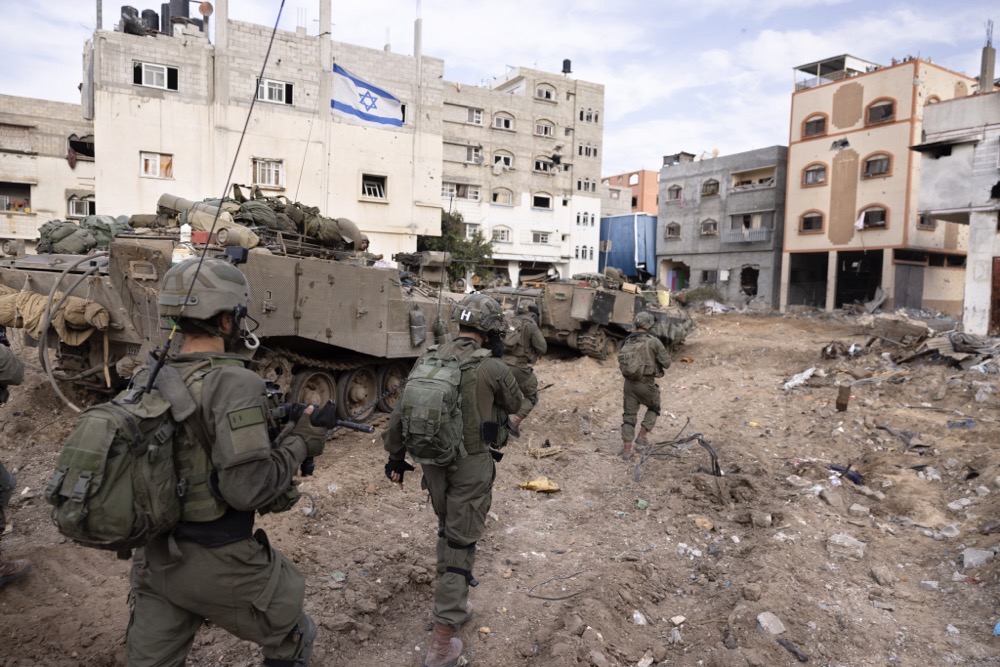
Israeli soldiers take part in a ground operation in Gaza City's Shijaiyah neighborhood. (AFP)
The 24-km-wide security zone, which was policed by the Israeli military and its Christian militia proxies of the South Lebanon Army, was established during Israel’s occupation of southern Lebanon in the aftermath of the 1982 Lebanon War.
Similar to the trigger for the war in Gaza, that conflict was sparked by a string of attacks on Israel by Palestinian militants launched from Lebanese territory, prompting Israel to invade Lebanon.
At the time, Israel’s reasoning for creating the security zone in southern Lebanon was to establish a buffer separating Israeli civilians in its northern towns along the border from Lebanon-based militants.
However, policing the security zone ended up costing hundreds of Israeli lives and it was quickly overrun by Hezbollah fighters the moment Israel, then led by prime minister Ehud Barak, chaotically withdrew troops in May 2000, abandoning its SLA allies.
Opinion
This section contains relevant reference points, placed in (Opinion field)
Experts believe creating another buffer zone, albeit on a smaller scale within Gaza, would also likely end in failure, do little to improve Israel’s security, and further undermine efforts to resolve the Israeli-Palestinian conflict.
“The serious conversation now and agreement should focus on what to do with Gaza,” said Asali. “Separating the future of Gaza from the West Bank by an international agreement means the end of Palestine.”
Others are less skeptical about the possibility, not to mention the allure, of a south Lebanon-style security zone in Gaza. “It’s a definite possibility,” Hussein Ibish, senior resident scholar at the Arab Gulf States Institute in Washington, told Arab News.
“In fact, I would expect it to happen if Israel decides not to fully reoccupy the interior of Gaza. And even if it does, it would still probably create a south Lebanon-style buffer zone.”
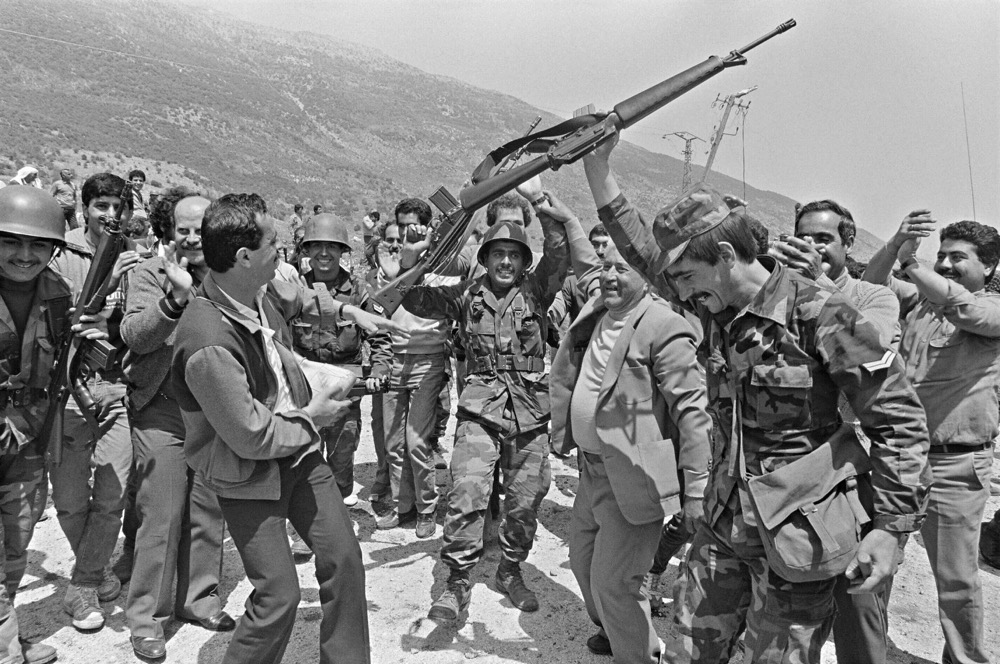
Villagers greet soldiers of Lebanese Army, 24 April 1985, in their village of Aamiq, in the Beka'a valley. (AFP/File)
Ibish believes such a buffer is almost “inevitable” in Gaza, and might even be replicated in parts of the West Bank, “either connected to or as a precursor of major annexation.
“That very much remains to be seen, and it depends on whether Israel decides to negotiate with Palestinians again to create stability, or impose its own solution by force, not only in Gaza, but in the West Bank as well.
“Frankly, I expect the latter, but I’m ready to be pleasantly surprised.”
A move toward a buffer zone would also not bode well for a negotiated end to the decades-old Israeli-Palestinian conflict, making a two-state solution far less probable and further Israeli land grabs far more likely.
“A buffer zone around Gaza pushes Israel in the direction of forced, unilateral solutions, relying on power rather than negotiations,” said Ibish.
FASTFACTS
• Israel’s security zone in southern Lebanon lasted from 1985 to 2000.
• The belt of land was 24 km wide from the Mediterranean Sea to the Shebaa Farms.
• Area was meant to keep Lebanon-based fighters away from the Israeli border.
“I think it’s consistent with the way in which Israeli society has been moving toward annexation rather than negotiations and using its extremely asymmetrical power over Palestinians to enforce ‘solutions’ that are consistent with Israel’s ambitions and intentions.”
For Ibish, a security zone would represent a continuation of the conflict and not a lasting solution. “The conflict will continue unless and until there is an agreed-upon resolution,” he said.
“But when we see this degree of power asymmetry and completely irreconcilable ambitions, it is typical of human beings to impose their will by force if they can. I don’t expect the Israelis to behave any differently.”
One postwar scenario favored by many in the Palestinian camp and by the US is the establishment of a common authority for Palestinians in Gaza and the West Bank. How this can be established amid the conflict, however, is uncertain, and much will hinge on the postwar landscape.
“The present moment, in my view, offers a de-facto arrangement that will eventually become a reality and would have to allow for a common future for the Palestinians living under the same authority,” said Asali of the American Task Force on Palestine.
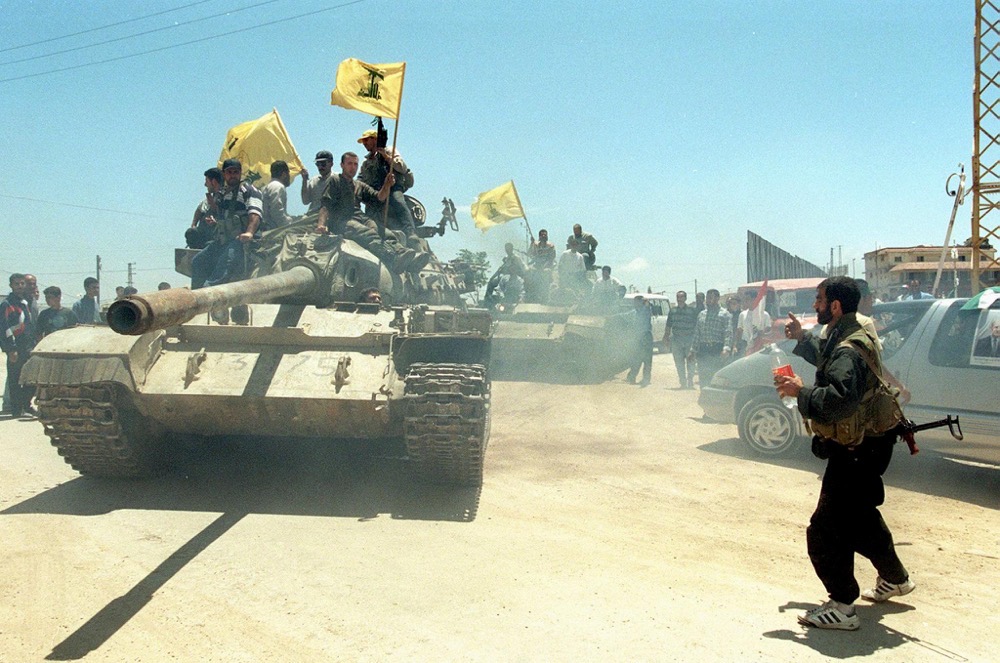
Hezbollah fighters parade with South Lebanon Army (SLA) tanks they have seized in the southern Lebanese village of Bint Jbeil 23 May 2000. (AFP/File)
“The interim agreement in Gaza would have to allow for that. This means that the formation of a new government in the West Bank could be an initial step toward what might be a serious end to the conflict.”
In Asali’s view, the creation of security zones would only frustrate efforts to find a lasting resolution to the conflict. “A buffer zone in Gaza can be imposed, like so many other things, on the Palestinians,” he said. “But it would be an added problem rather than a solution.”
Yoav Gallant, Israel’s defense minister and a retired IDF general, recently underscored the temporary nature of the proposed buffer zones when asked if they could be created above American objections.
He said that, were Israel to establish what he called security areas, it would remove them on its eventual withdrawal from Gaza. “While we’re operating, anything is possible,” he said, “but after we finish the conflict, we have no reason to be there.”
Buffer zones are a “security step for a certain period,” Gallant said.
Some Israeli analysts are not convinced of the benefits of a long-term security zone given the risks and diplomatic costs.
Meir Javedanfar, a Middle East lecturer at Reichman University in Herzliya, believes it is too soon to discuss what will happen after the war in Gaza.
“I think it’s too early to start talking about the day after tomorrow in Gaza,” he told Arab News.
“There are too many moving parts and variables involved in the current war to enable us to give an accurate forecast of what will happen the day after Gaza, the day after the end of the war, and the day after Hamas is removed from power.”
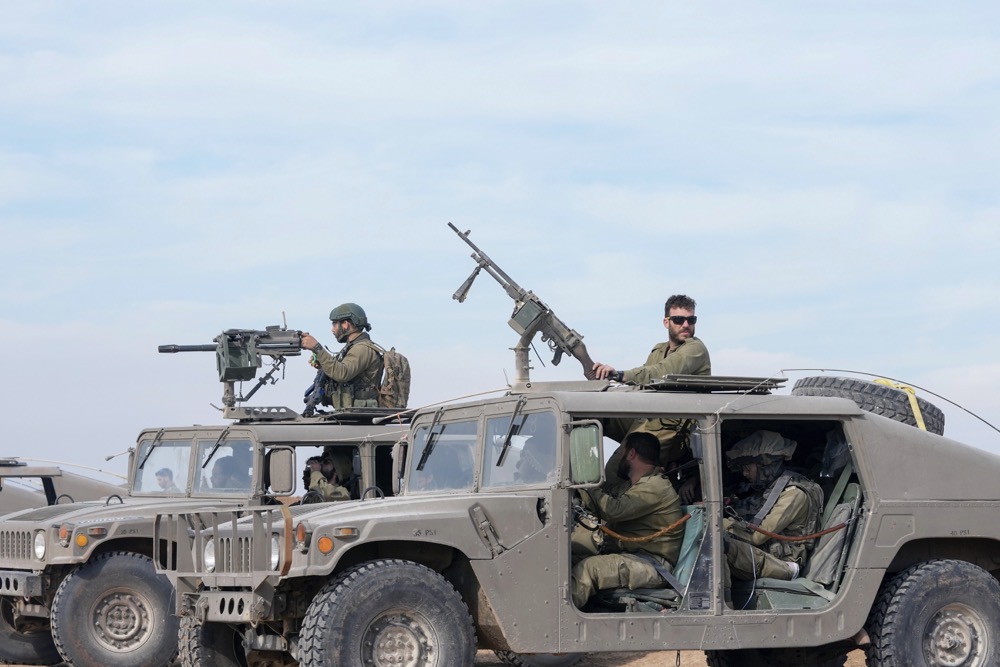
Israeli soldiers gather near the border with the Gaza Strip. (AP)
Nevertheless, whatever the outcome of the war, Javedanfar does not believe it will be feasible — either militarily or diplomatically — to set up security buffer zones inside Gaza.
“First of all, diplomatically, it would probably really strain our relations with the US,” he said.
“This is something that Israel cannot afford at this point. And I think we’d also place our relations with the Europeans under strain.
“Secondly, what is the point of having a security zone inside Gaza when Israel can be reached from any part of Gaza? If, in the future, a terrorist (group) is going to get its hands on the plans to build another missile, they can fire from anywhere inside Gaza; Israel is within reach from anywhere within Gaza.”
Javedanfar said the idea does not make much sense to him, and “it’s safe to assume that it’s unlikely that we are going to see such a security zone.”
